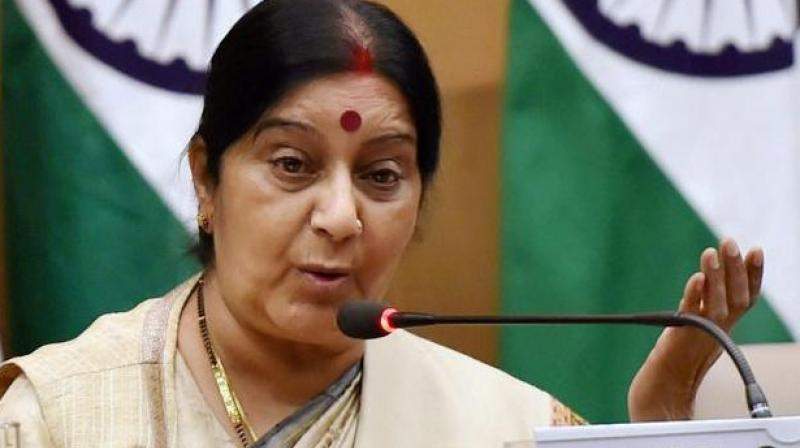BRUSELLS: External Affairs Minister Sushma Swaraj warned today that all the effort put in by countries to tackle climate change would face a setback if developing nations did not get adequate finances and technologies to
Translate their political commitments into tangible initiatives.
Swaraj during her address at the ‘EU High Level Event on Climate Change’ here, Swaraj said climate change posed significant development challenges, especially for developing countries.
“It can pose a threat to the food and water availability in developing countries, on their nutritional needs, livelihoods, health and well being, and energy security. The response to these challenges must therefore be in terms of solutions that factor in developmental requirements,” she said.
She said that the capacity of developing countries to translate their political commitments into tangible initiatives and projects gets constrained by lack of predictable, sustained and adequate finances and technologies.
“The scale of resources required for the ambitious and effective achievement of the Paris Agreement or the 2030 Agenda is enormous. The need for global partnerships, in this regard, is recognised in these processes and is at the core of all solutions offered therein.”
“If these major documents are not implemented to reflect equity and principle of Common But Differentiated Responsibility, or fall short of the targets because the developing countries did not receive the requisite support, it would be a setback to all the effort put in by countries in a spirit of togetherness,” she said.
She said that the schedule for phasing out of hydrofluorocarbons under the Montreal Protocol could be achieved as it was accompanied with a robust financial package to help developing countries make the transition to cleaner technologies.
“The world needs a similar roadmap for finance and technology if we have to achieve the goals set out in the Convention and its Paris Agreement,” Swaraj said.
“In its absence, developing countries will face serious constraints in achieving their existing (Nationally Determined Contributions) NDCs. Any expectations of them to enhance their ambitions should be matched with enhanced support,” she added.
Swaraj also recalled Prime Minister Narendra Modi’s remarks at Davos earlier this year in which he referred to terrorism, environmental degradation and climate change as ‘issues which have the capacity not only to fracture but also to frustrate many good things which human race has achieved.’
“These challenges are global in nature, and can be tackled only through global cooperation,” she said.
Swaraj said India is committed to contributing effectively to the efforts at forging common and united action.
“We are also conscious of the expectations the world has from India and are striving to accomplish the objectives set out in major global agreements,” she said.
India has set a target of generating 175 Giga Watts of solar and wind energy by 2022.
“We have undertaken mission mode action to provide electricity to every household and cleaner sources of cooking fuel to poor women,” she said.
India would have not only reduced the emission intensity of our GDP by 25 per cent over 2005 levels by 2020, but is also committed to further reduce it by 33 to 35 per cent over 2005 levels by 2030 as part of our Nationally Determined Contributions (NDCs).
Swaraj also mentioned other steps like The International Solar Alliance, which iNDIA launched with France, to provide cheap and affordable energy to all.
“We are also optimistic people, who believe in humanity’s ability to tide over seemingly insurmountable problems. We will continue to work with all stakeholders for our common well-being,” she said.
Swaraj concluded her speech by invoking a prayer from the Vedas that also finds mention at the very beginning of India’s Nationally Determined Contributions. (AGENCIES)
Home Latest News Developing nations need adequate finances, technologies to combat climate change: Swaraj


